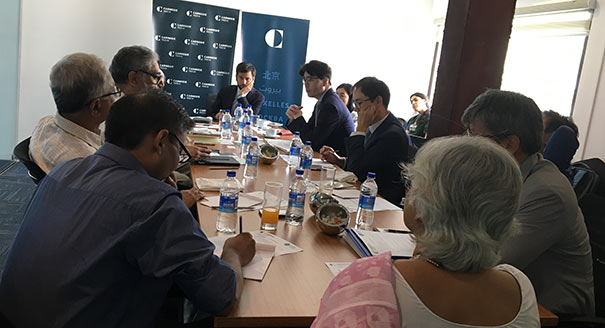Registration
You will receive an email confirming your registration.
The uncertain future of U.S. internationalism, the growing tension between Russia and the West in Europe and the Middle East, and China’s growing assertiveness in Asia is drawing new attention to the role of middle powers in shaping the international order. To share and compare the perspectives of two important middle powers, India and Korea, Carnegie India organized a workshop in partnership with the Hankuk University of Foreign Studies, Seoul and Georgetown University, Washington DC. This workshop was the second leg of a multi-year engagement program among research institutions in India, South Korea, and the United States , supported by the Global Research Network program of the National Research Foundation of Korea.
DISCUSSION HIGHLIGHTS
- Similar Regional Environments: India and South Korea have had different development trajectories and contrasting attitudes toward military alliances, participants said. Yet, participants added, both countries have similar regional environments and a growing potential to be stronger players in the international community. Discussants assessed the impact of the changing power distribution between the United States and China on the security environment in both the Subcontinent and the Korean peninsula. Among the other issues that figured in the discussion were the emerging concerns in India and South Korea on the rise of China, the weakening of U.S. alliances, the new pressures on multilateralism, the growing difficulty of enforcing international norms, and the new imperatives on middle powers to diversify their security partnerships.
- Partition Syndrome: The discussion examined the impact of the division of the Subcontinent and Korean peninsula on the internal politics and external relations of India and South Korea. Participants said that although New Delhi and Seoul have become much larger economic entities than Islamabad and Pyongyang, they both face great difficulties in normalizing their relations with their estranged siblings from the partition. The internal politics of India and South Korea, where there is natural empathy and intense hostility to their neighbors, make it difficult to find an appropriate combination of carrots and sticks in dealing with Pakistan and North Korea, they said. The participants also discussed the elusive but enduring political goals of unification in the Korean peninsula and the construction of good neighborly relations between India and Pakistan.
- Nuclear Weapons: The introduction of nuclear weapons has imposed major constraints on the policies of India and South Korea toward Pakistan and North Korea respectively, discussants said. If Pakistan’s nuclear parity has generated challenges for Indian policymaking, the nuclear asymmetry between North and South Korea has generated problems for the latter. Discussants examined whether the recognition of North Korea could help defuse tensions on the Korean Peninsula or if it would create greater harm by adding to the insecurity of other regional actors like Japan. They also examined the potential consequences of South Korea’s acquisition of nuclear weapons or deploying U.S. tactical nuclear weapons as a deterrent against North Korean aggression. Some discussants compared the current debate in South Korea on the cost benefit calculus of creating a national nuclear arsenal with that in India in the early 1990s, when New Delhi had to cope with the reality of Pakistan’s nuclear weapons.
- Role of China: Participants discussed the role of China in exacerbating the security challenges of India and South Korea. They discussed how China’s strategic aims drive military and economic support to both Pakistan and North Korea. One participants cited as an example Beijing’s attempts to achieve naval interoperability between Pakistan and China to project its power in the Indian Ocean. Cautioning against the Chinese ambition of achieving a unipolar Asia, participants argued in favor of other players forging alternative arrangements to preserve greater multi-polarity, despite U.S. retrenchment.
- Regaining Agency: The idea of gaining greater control over the policy toward their difficult neighbors came up for an intensive discussion. Despite the limited prospect of near-term success, the participants felt that New Delhi and Seoul have no option but to try different paths to peace. They underlined the importance of focusing on multilateralism, economic connectivity, and regional cooperation, which could favorably alter the political dynamics in the Subcontinent and the Korean peninsula. They stated the need for strengthening partnerships with swing states, such as Japan, and other strategic players in Asia to balance China’s growing negative role. Participants acknowledged that South Korean domestic politics make it hard to promote political cooperation with Japan, despite common interests. However, they did consider the possibility of both sides resolving their differences if the threats they faced increased in magnitude.
This event summary was prepared by Yashna Jhaveri and Dishana Kidambi, interns at Carnegie India, and Sharanya Rajiv, researcher at Carnegie India.
